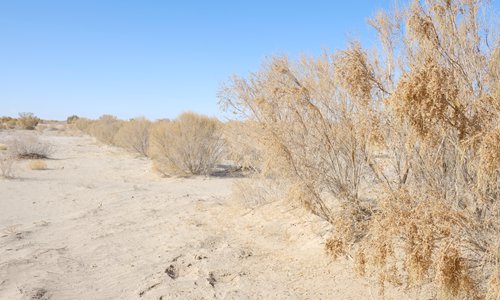HOME >> CHINA
Chinese experience, technology help solve ‘the most staggering disaster of the 20th century’
By Zhao Yusha in Nukus Source:Global Times Published: 2019/10/29 18:38:40

Holoxylon Aphyllum on the Aral Sea bed in Uzbekistan Photo: Zhao Yusha/ GT
The rust fish boats in the ship graveyard of Muyqak, a small town in Uzbekistan, are a famous tourist spot for people all over the world, eager to get a glimpse of the town.They once lay at the heart of former Aral Sea, but desert and wetlands now surround these ancient relics.
Seventy-six years old Musa was once a fisherman in this town. He said the Aral Sea's disappearance is one of the biggest changes in his life. The history of Karakalpak people starts with fishing, but since the Aral Sea is shrinking, many people have left, and those who were fishermen have found new jobs, said Musa.
Musa works at a tourist spot in Muyqak, which has a museum and boutique shops to show local characteristics of Uzbekistan's Karakalpakstan people.
The newly-built tourist spot is part of the Uzbek government's recent effort to alleviate Muyqak residents' social pressures as the sea's disappearance has reshaped lives in the once portside town with lively a fishing industry.
Today, the remains of the Aral Sea are less than 10 percent of its 1960 level. The Aral Sea, lying between Kazakhstan and Uzbekistan, was once the world's fourth largest body of inland water but has shrunk remarkably in recent years due to climate change and increasing human activities.

Women wearing pink aprons lined up at a textile factory in Muyqak, Uzbekistan on Thursday. Photo: Zhao Yusha/GT
Being described as "the most staggering disaster of the twentieth century" by the United Nations, the Aral Sea's disappearance has attracted worldwide attention, especially Uzbekistan, where part of the sea lies.
The "Aral Sea Region - Zone of Environmental Innovation and Technologies," an international conference was held in Nukus, Uzbekistan on Friday.
More than 200 participants of the conference including representatives of diplomatic corps of foreign countries, international environmental organizations, and associated experts in the field were acquainted with exhibitions on the consequences of the Aral Sea disaster, and projects for its mitigation.
The conference's main goals are to present Uzbekistan's recent efforts in restoring the Aral Sea region, develop measures to create conditions for implementing environmentally friendly technologies around the area; introduce environmentally friendly energy and water saving technologies; and prevent desertification.
Uzbekistan has also deployed new water conservation technologies, such as drip irrigation, and increased water flow in the Aral region to solve water problems, Dr Zinovy Novitsky, coordinator of Uzbekistan state program on improvement ecological situation in the Aral Sea basin, told the Global Times during the conference.
Novitsky said that the government is using laser land leveling technology to plant desert plantations on hydromorphic salt marches of dried bottom of Aral Sea to prevent desertification.
As he strokes the branch of one white-grey shrub standing two and a half meters high, Novitsky said after five years, people who visited Muyqak before won't be able to recognize their trip today, because this place will be covered by forest.
Muynaq's economy shrunk along with the Aral Sea, and the loss of livelihood prompted residents to seek a living elsewhere.
The Uzbek government is creating jobs in this area to improve people's lives and revive the economy. Tashkent has built colleges and textile mills to transform Muyqak from a fishing village in decline into a modern hub of industry, tourism and research.
The Uzbek government said it envisaged implementing 42 projects between 2018 and 2019 in Karakalpakstan, which is providing the basis for eight hotels, three camping sites, three logistics centers and a cafe catered to tourists.
Women with pink aprons lined up at atextile factory in Muyqak, ready to show guests their workplace. A woman in her twenties told the Global Times that although only earning about five dollars a day, her salary of working in the textile mill is the major income source of her family.
China's contribution
Novitsky told the Global Times that they have also been eyeing China to learn about the latest technology to treat desertification and to enhance water resource management.
The Uzbek government and organizations dispatched several delegations to China to talk about cooperation on introducing its technology, he said.
The Chinese Academy of Sciences (CAS) has recently signed agreements with a group of Uzbek research institutes to strengthen cooperation on the ecological restoration of the Aral Sea, the Xinhua News Agency reported.
According to the agreements, CAS will build joint laboratories with Uzbek institutions and universities, as well as carry out further cooperation in various fields, including ecological environment monitoring, biological resources exploitation and saline land improvement.
The Aral Sea situation is similar with some parts of northern and northwestern China, Liu Wenjiang, executive deputy director of research center for ecology and environment of Central Asia under CAS told the Global Times during the conference.
Having advanced knowledge and technologies in agricultural water conservation, ecological restoration, desertification control, biodiversity conservation and sustainable management of water resources, China is willing to provide its experiences to Central Asian countries, said Liu.
The country also signed contracts with Chinese companies to use their latest technology for addressing the Aral Sea problem.
Zhao Jinling, a vice president of China's Elion Group, said the Uzbek government visited his company in April and intended to introduce its drone seeding technology. The technology can detect what kind of seeds are suitable in the soil and then seed the soil accordingly with different kinds of seeds.
During the conference, Ildar Shigabutdinov, director-general of multilateral cooperation under the Ministry of Foreign Affairs of Uzbekistan praised China's effort of saving the Aral Sea, and said that under the framework of Belt and Road Initiative, China has handed them financial support to address the Aral Sea issue.
Helping other countries to resolve their environmental issues is in accordance with building a community with a shared future for mankind, said Liu, noting that it is also part of China's goal to build a "green" BRI economic zone.
Newspaper headline: Uzbek govt enhances efforts to restore the Aral Sea
Posted in: IN-DEPTH,CHINA FOCUS